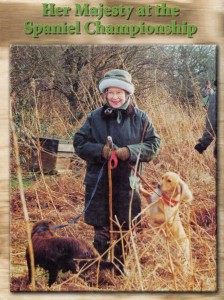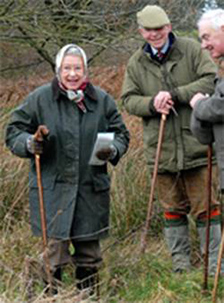Are You Ready for Some Fruitcake?
(Adapted from The Maine Sportsman column, December 2002)
Just because our dogs are sporting dogs, it doesn’t mean they stay outside 365 days a year. For most of you, your dogs are your pets too, an integral part of your family. You spend hours training them for their outdoor field work, but what about their manners around the home?
Now I’m a firm believer in “Love me, love my dogs,” however, there are limits to everything. A little dog hair on the clothes — a gentle nudge for some loving, or an affectionate plunk of a head on the lap? So what? No big deal. The world out there can cope with it. But….getting pawed, even knocked down by an over zealous pooch? Scratches on a car’s paint job? Incessant barking? Not good. Better do something about it.
AN UGLY SCENARIO
Picture this: On December 21st; Uncle Phil and Aunt Sally make their annual fruitcake delivery to your house. As usual, you’re not ready — for them or their fruitcake. When they pull up the driveway, two spaniels suddenly appear, barking and running around in front of their car. When the car stops, the excited dogs jump at the doors, leaving scratches it will take Phil hours to remove with rubbing compound. When Aunt and Uncle get themselves together to exit the car, the spaniels jump for the fruit cake (what do they know?), staggering poor Aunt Sally, leaving muddy paw prints on her white Christmas slacks. Then the two Seniors are forced to run the gauntlet for the front door, playing “spaniel keep away” with their fruitcake.
It’s a short visit. If the dogs aren’t begging for food, they’re pawing, jumping, or begging for attention. Any conversation is constantly interrupted by: “No!”, “Get down.” “Go away.” “Shut up!” When Sally and Phil leave, they are relieved and thankful they don’t have to return until next year. They grumble about your undisciplined dogs all the way home and aren’t impressed one little bit by all their awards and ribbons on the wall.
A BETTER SCENARIO
Uncle Phil and Aunt Sally pull up the driveway. They hear dogs barking, but don’t see them. When the front door opens, they see spaniels sitting at attention, much like a receiving line. Phil and Sally reach for dog treats from the bowl on the bookcase near the door. They give each dog a treat, then ignore them while they deliver the fruit cake and begin the family visit. One young springer is in a large wire crate by the living room sofa. When the family sits down for coffee and pie (we’ll save the fruit cake), the older dogs lie on their respective beds.
BARKING
When a vehicle pulls in the driveway most dogs bark. That’s o.k.; we want to know when someone comes, but, after the initial warning is acknowledged, the barking should stop. If dogs are allowed to continue, they teach themselves to bark — incessantly. If one dog in the pack barks, he will teach the others. Ever been to a hunt test or trial when one spaniel starts it?
When dogs become indiscriminate barkers, it is annoying and should be corrected. Hopefully, a barker will stop early in their career with an acknowledgement, a nudge to the shoulder, an upraised hand, a “No”, or other negative sound “AAAAAAAAA!!!”. Some owners put pebbles or pennies in an empty can (the hole closed with duct tape) and give it noisy shake. Others spritz the dog with water from a squirt bottle. If you get to the screaming “Shut up!” stage, you’re in trouble.
I am not a great proponent; however, a bark collar can come in handy as a last resort. A $39 investment can cure the problem. I know a man with several dogs and one bark collar. He rotates it; an occasional reminder seems to be all it takes. People turned off by the electrical impulse of a bark collar can invest more dollars in the Citronella collar which emits a slight puff of citronella when the dog barks. The odor usually distracts the dog from further barking. With barking, it’s the distraction that works — just find the right one early.
JUMPING
It’s easy teaching puppies not to jump on people. It’s more difficult with the older dog, but not impossible. A lowered hand in front of their face discourages a jumper and encourages a hup. Giving an encouraging pat on the chest for the hup reinforces correct behavior; stopping the jump and forcing a hup demands it. If you’re in the midst of training your dog not to jump, share your methodology with visitors who usually make the mistake of raising their hand (instead of lowering it) and enticing a jump. It’s bad enough getting Aunt Sally’s slacks dirty, but it’s a lot worse when a youngster gets their face scratched.
Instead of jumping on visitors when they enter your home, a dog can be taught to sit if the payoff is worth it. Two family members and one dog can practice this routine: (1) Person #1 knocks on the door. (2) Person #2 holds the dog inside at hup (on lead if necessary). (3) Person #1 opens the door and gives the dog a treat. (4) Persons #1 and #2 then continue into the house without making a fuss over the dog. Attention comes later when the dog is not so excited. Keeping a bowl of small treats inside the front door encourages visitors to participate. Eventually when someone knocks, the dog runs to the door and sits in anticipation of the treat. (NOTE: treats don’t have to be huge or fattening. We like the small flavorful liver ones – Charlie Bears.)
BEGGING
If you feed snacks or table scraps to your dogs indiscriminately — STOP!!!! When guests arrive, you’ll realize you’ve created a monster that won’t leave anyone alone who is eating. Dogs are fed dog food in their “place” and that’s it. If you’ve gotten in the habit and don’t object to feeding a few scraps or offering tasty licks from your dinner plates, parcel that reward after you eat and clear the table. Let the “dog prewash” begin there. If nonbelievers are around, do it out of their sight.
UNIVERSAL SOLUTION
If it’s too late to cure your canine of his sins around company, invest in a large wire crate and turn it into his personal play pen, dining room, and bedroom. Initially, use the crate only as a reward site: dinner, the softest bed, a treat or chew place, an escape from the cat or young children. Make it close enough to the family to be a part of the action, get frequent pets, and attention. When it’s just the family around, leave the crate door open; your dog will choose to visit it on his own. He will take ownership of his crate and be content to stay there with the door closed when company arrives — just as long as he gets some recognition. He’s happy and so are your guests.
JUDGES
People are amazed when they see and hear of the accomplishments of our “spaniels in the field.” They are duly impressed with the ribbons hanging on the wall, concrete evidence the spaniels have passed muster in the eyes of some judges out there. But how is their performance judged out of the field. After all, that’s where they spend most of their time. We have proved they are trainable and we know how to train for the field. Surely we can do it for the home.
Are you ready for some fruitcake?
PROFILE: CARY HAUPT AND BARBARA HAUPT
In the small fishing village of Tenants Harbor, Maine, Cary and Barbara Haupt have been called “that energetic old couple that train dogs”. The locals are used to seeing them work their English cockers in the fields, salt water coves, and ponds in and around the village. Those who visit the Haupt’s home know their dogs are primarily their pets and live in their home year round.
Both Cary and Barbara grew up in southeastern Pennsylvania during the years when wild pheasants were plentiful. As youngsters they were exposed to hunting and to gun dogs by patient family members. Both Cary and Barbara developed a love for dogs, dog work and hunting the uplands at an early age.
The Haupts and their English cocker spaniels have hunted game birds and water fowl from the woods and waters of Maine to the cornfields of Iowa, to Mississippi and the Carolinas. Cary Haupt is a Registered Professional Maine Guide. When these two aren’t involved in hunting and guiding, they enjoy judging and participating in AKC hunt tests and field trials. In the field and in the home, Cary and Barbara love their cockers; they also enjoy making friends with others in the cocker family.
BARBARA HAUPT
P.O. Box 303 1200 WORDS
Tenants Harbor, ME 04860
(207)372-6746
talefeat@midcoast.com
SPANIELS IN THE FIELD
All Rights Reserved



